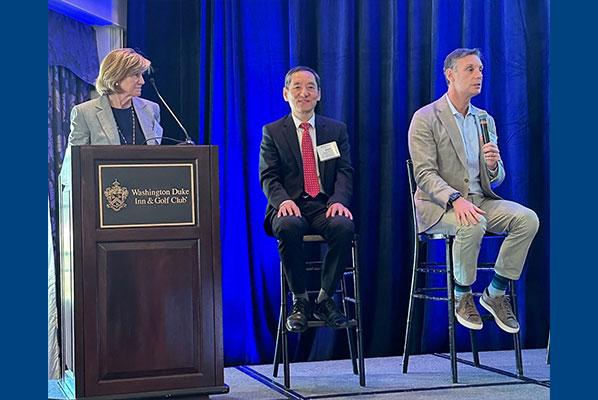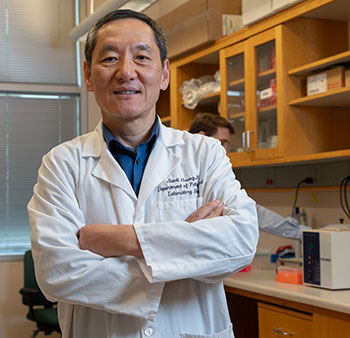
Duke University School of Medicine Dean and Executive Vice President for Health Affairs Mary Klotman, MD, and Duke Cancer Institute (DCI) Executive Director Michael Kastan, MD, PhD, invited Pathology Chair Jiaoti Huang, MD, PhD, and Duke School of Medicine Eleanor Easley Distinguished Professor Daniel George, MD, to present together to a joint meeting of the School of Medicine Board of Visitors and the DCI Board of Advisors on Fri., Oct. 13th, 2023.
Their leadership roles and longstanding expertise resonated well with the Boards, as it related to highlighting the importance of basic, translational, and clinical research in prostate cancer and the multidisciplinary partnerships represented by the Department of Pathology and the DCI Center for Prostate and Urologic Cancers.
George began with an introduction of prostate cancer clinical care and the multifaceted research landscape, and then Huang brought it all together, highlighting two examples of team science that have led to significant advancements.
Both speakers have extensive experience with prostate cancer research and have received national and international recognition for their work.
George is a Professor of Medicine and Surgery in the divisions of Medical Oncology and Urology at Duke University School of Medicine. He also has appointments in the Duke Clinical Research Institute and the DCI, where he’s the director of Genitourinary (GU) Oncology disease-based group and is co-lead of the DCI Center for Prostate and Urologic Cancers.

George has led the Duke site for the U.S. Department of Defense (DOD) Prostate Cancer Clinical Trials Consortium since 2006, specializing in Phase I and II studies in prostate cancer. He is also the Principal Investigator (PI) of the Metastatic Renal Cell Carcinoma (MaRCC) and ODYSSEY registries in advanced renal cell carcinoma and Co-PI of IRONMAN, an international, multi-sponsor supported registry in advanced prostate cancer.
He’s also an internationally recognized clinical researcher and thought leader in GU malignancies, with over 200 peer-reviewed publications. His areas of research include new drug development and biomarkers of GU cancers with an emphasis on signal transduction pathways and cancer disparities. He has led efforts defining the clinical benefit of Vascular Endothelial Growth Factor (VEGF) receptor targeted therapy in renal cell carcinoma in both the metastatic and in the adjuvant setting. In addition, he has championed studies evaluating the outcomes of novel hormonal agents by race in metastatic castration resistant prostate cancer.
George recently served on the ASCO Scientific Committee for non-prostate cancer (Chair 2018), the Conquer Cancer Foundation (CCF) Young Investigator Award Committee (Chair 2019-20), the AACR Clinical and Translational Cancer Research Grants Scientific Review Committee (Chair 2017-18), the renal cancer cadre leader for the Alliance GU Scientific Committee, NCI GU Steering Committee and the NCI Renal Task Force. He also serves as a senior editor for Clinical Cancer Research and as co-editor in chief of Clinical Advances in Hematology and Oncology. He is a section editor for UroToday and serves on the OncLive Giants of Cancer Care Committee.
Huang is the Johnston and West Endowed Department Chair for the Pathology Department and professor, who also leads a prostate cancer research lab that has been continuously funded over the past twenty years. He’s an internationally renowned surgical pathologist and prostate cancer researcher, a leading authority on the molecular mechanisms of carcinogenesis and disease progression and the development of biomarkers and new therapeutics for prostate cancer.

He received his PhD and conducted Anatomic and Clinical Pathology residency training at the New York University School of Medicine, and carried out a fellowship in Oncologic Surgical Pathology at the Memorial Sloan-Kettering Cancer Center. He is a physician-scientist with clinical expertise in the pathologic diagnosis of genitourinary tumors including tumors of the prostate, bladder, kidney and testis. Another area of interest is gynecologic tumors. In his research laboratory they study prostate cancer, focusing on molecular mechanisms of carcinogenesis and tumor progression, as well as biomarkers, imaging and novel therapeutic strategies. In addition to patient care and research, he is also passionate about education and has trained numerous residents, fellows, graduate students and postdocs.
His prostate cancer research work is extensive, and he received RO1 grants both in 2022 and 2023. In January 2022, he was senior author of a groundbreaking study identifying a molecular signal that can be developed into a test to identify patients in need of prostate cancer treatment early in their diagnosis. The study received funding from the NIH (1RO1CA205001, 1RO1CA200853) and the Prostate Cancer Foundation. Read more about it here.
Also in 2022, the Huang Lab discovered a novel metabolic pathway that is critical for prostate cancer, introducing a new way to control tumor growth. Read more about that study here.